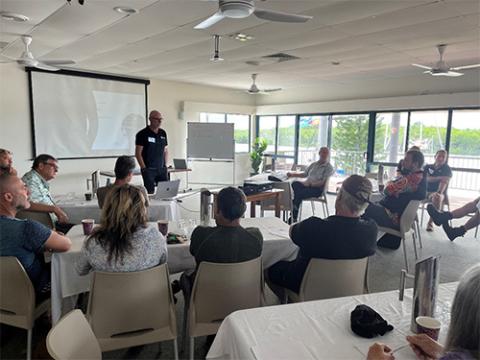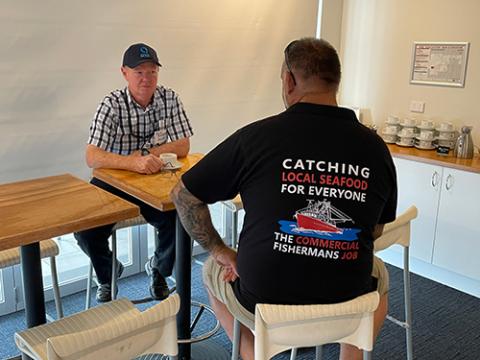1500+ years of fishing experience come face-to-face to discuss issues facing the East Coast trawl sector.
By Dempsey Ward
Trawl fishers from northern Queensland met in two workshops – in Cairns and Townsville – to discuss current issues relating to the East Coast Trawl Fishery.
There was plenty of experience in the room. Two-thirds of workshop participants had over 30 years of experience within trawl fishing – with one fisher having over 68 years to their name.
The Cairns workshop was initiated by boat owner and skipper Mr Jim Newman with FRDC Extension Officer Dr Steve Eayrs helping to setup the workshop, while the Townsville workshop was initiated by boat owner and skipper Mr Neil Mogensen.
The aim was simple. To encourage discussion of issues and shared concerns in a safe and collaborative environment, as well as to foster relationships between stakeholder groups within the sector – a priority for newly appointed FRDC Extension Officer Steve, who whilst based in Maroochydore, is quickly building strong relationships throughout Queensland.
Neil Mogensen was thrilled that the workshop provided information to keep everyone in the loop, which he says is difficult in a time-constrained sector that operates remotely, and largely in isolation from one another.
“The workshop’s aim was really to put everyone in connection with each other and discuss both issues and opportunities for the sector to work together.”
“It allowed key people in the workshop to end their presentations with ‘Here’s a face and a phone number’, creating that visible contact. That’s gold for the industry.”

FRDC Extension Officer Steve Eayrs presenting to a room with 1500+ years’ fishing experience.
The workshop kicked off with short introductions from all participants, helping establish everyone’s roles and their experience before discussions took place. This was followed by a presentation describing FRDC, FRDC’s Extension Officer Network and the process for raising research ideas for FRDC funding.
A range of presentations included:
- Queensland Seafood Industry Association’s (QSIA) newly appointed CEO, David Bobbermen gave an overview of the association and key industry priorities.
- Dr. Rik Buckworth from Sea Sense Australia provided an update on the work currently being undertaken his team to evaluate the status of prawn stocks in northern Queensland.
- Queensland’s Department of Agriculture and Fisheries presentations on data security and the newly developed digital logbook application – a method used to help capture stock assessment data. Recent refinements have made downloading and using the app. The positive reception led to numerous participants requesting in-person training in the logbook app use. This training will allow fishers to further contribute towards stock assessment and ensure a sustainable future for the sector.
- Ongoing safety and mental health initiatives.
There are a range of physical and mental health initiatives that have been developed specifically for the wild catch fishing and aquaculture sectors.
The Stay Afloat program - an online mental health training program designed specifically for the fishing and aquaculture sectors – was presented by Seafood Industry Australia Program Manager Jo Marshall.
The training program offers participants to learn how to identify when someone is having mental health problems, and how to assist them during a crisis.
Steve says that the importance of accessible mental health programs for the industry cannot be understated.
“Being away at sea for multiple days at a time can be extremely challenging both physically and mentally. Programs like Stay Afloat can help save lives.”
FRDC funded project SeSafe is another initiative set up to raise awareness and improve safety performance in fishing and aquaculture Australia wide, by helping improve safety performance on boats in Australia. Steve described the program, including how fishers can access the free training and the process for gaining access to the safety training modules (videos).

David Bobbermen (QSIA Chief Executive Officer) talking with commercial fisher Neil Mogensen
Discussion then turned to cameras on boats, with Mick Smith and Nancy Trieu from the Queensland Department of Agriculture and Fisheries describing a project to test the efficacy of onboard camera systems to document interactions with sea snakes and other species. Workshop co-creator Jim Newman said this could be a touchy topic for a lot of the industry.
“There continues to be a lot of anxiety around cameras being placed on boats,” Jim says.
Detailed discussion followed, with Departmental officials, industry representatives and skippers who had implemented surveillance cameras, bringing different perspectives to the table.
Questions on purchase and installation costs, the amount of footage needing to be reviewed and privacy concerns, highlighted the complexity of this initiative.
Options were also suggested on how to keep fishers regularly informed of new developments. Podcasts, community hubs and national workshops were seen by fishes as effective ways to deliver information. With strong support for future workshops, Steve is eager to see the industry work closer towards a resolution on the issues discussed at the workshops.
“I’m thankful to all those who gave up their valuable time to participate in these workshops and keen to see the work done today progress into resolutions for the future.”
“Fishers who participated now have a greater understanding of issues affecting their industry, they are hopefully in a better position to work more effectively toward a satisfactory outcome,” Steve said.
The workshops were funded by FRDC and hosted by FRDC Extension Officers, Steve Eayrs (Queensland) and Lauren Thornton (Northern Territory).
The workshops are an early example of the contribution and impact that the newly formed FRDC Extension Officer Network can have on commercial fishing.
General Manager for Stakeholder Engagement Kylie Dunstan, who manages the FRDC extension and communication teams said the network was established in 2022 and now includes an Extension Officer in every state and territory.
“FRDC has appointed regionally based Extension Officers across Australia to directly engage with the people involved in fishing and aquaculture, to increase the adoption of research outcomes and to help tailor research and development (R&D) to their needs,” Kylie said.
“The Extension Officer Network was created after feedback from fishing and aquaculture stakeholders. They told us that we needed a team on the ground in the regions, to help accelerate the adoption of R&D outcomes and drive practice change’, she said.
“These workshops are a fabulous example of how the FRDC Extension Officers work directly with fisheries to deepen engagement and increase support for our stakeholders across Indigenous commercial wildcatch, recreational fishing and aquaculture, connecting them with the latest innovations, research and development.’
Planning for the next trawl workshop is underway and will likely be held in June at Hervey Bay to engage with fishers in south-east Queensland.
Contact
For more information, please contact Steve Eayrs. E: Steve.eayrs@frdc.com.au P: 0472 784 530
This reflects all R&D Plan Outcomes





